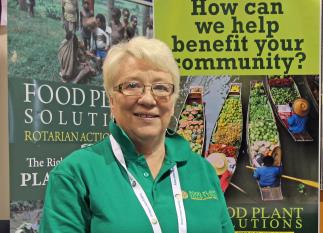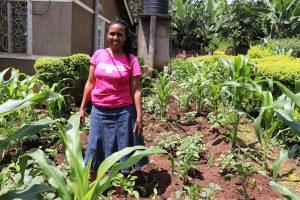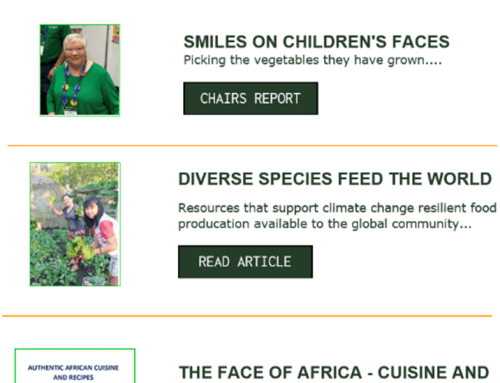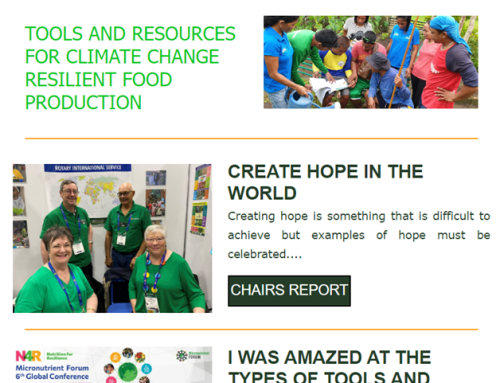In this edition we look at what opportunities there are to alleviate acute food insecurity.

Message from the Chair
As I write this all Rotarians are celebrating the year’s achievements in a year where “Rotary Connects the World”. We welcome the New Year where our theme is “Rotary Offers Opportunities”. The world has changed and our Rotary world has changed too. COVID-19 has become part of our everyday life. We, as clubs and committees, have had to look at how we work and how we can adapt in this time of change. My club meets for the first time this week in person, taking into account social distancing as well as enabling the use of Zoom, for those who cannot attend.
In some parts of the world just getting enough to eat each day; to feed children and families has become even more important. To this end, Food Plant Solution Rotary Action Group has developed brief planting guides for regions. The uptake of these has been amazing and is a great start for every community or Rotary Club that is trying to support their community at this time.
I had the pleasure of attending via Zoom, the District Assembly of District 3070, India, to launch the brief planting guides that have been prepared for them. We hope that we continue to work with them and to develop a major project.
We have lost some great Rotarians this year. One of those was Past Word President, Sir Clem Renouf, who gave me permission to use his quote when I as appointed the First Female District Governor in Australia (1999/2000). It states “Rotary gives people more opportunities to do more with their lives as they have ever dreamed possible.” I will remember him forever.
Best wishes for the coming year. We look forward to working with you.
Yours in Rotary
PDG Una Hobday OAM, PHF
Chair – Food Plant Solutions RAG

Fighting Poverty and Starvation in Tanzania – Anitha’s Kwayu Garden, Machame, Tanzania
Machame Rotary Club serves the community on the south-western slopes of Mount Kilimanjaro, Tanzania. We found the publications of Food Plant Solutions Rotary Action Group (FPS), through our partner, Rotary Club of Kingston-Frontenac (Canada)
Food security is an issue for many in our community and has been a focus of our club. We also see agriculture as providing opportunities for youth who would otherwise drop from the educational system after Standard 7.
Rotary member, Anitha Kwayu, has made her garden a living class-room for the community to experiment with new plants and technology. We grow traditional crops such as maize, bananas, soya beans, and many green vegetables as well as experimenting with new plants and technologies such as pesticidal plants, and azolla farming.
Anitha is actively promoting the FPS guide, Potentially Important Food Plants of Tanzania, as well as the Brief Planting Guide prepared to help combat the impacts of COVID-19. Anitha hopes to plant several “forgotten” plants from the FPS guide including tamarillo, potato yam, squash, and taro.
Eliud Jacob recently joined Machame Rotary and had been working with Anitha when COVID-19 closed the secondary school where he taught science. He returned to his home village in Kagera region (north-western Tanzania) where he accessed the FPS Brief Planting Guide prepared for the Lake Victoria region to share with the community. When schools re-open he hopes to return to work with Anitha and share their knowledge to build up the school gardens at the nearby primary and secondary schools.
Thank you Food Plant Solutions. Your sharing of plant knowledge is helping Machame fight poverty and starvation in Tanzania. Please contact us for more detail: info@foodplantsolutions.org
Healthy Diet = Healthier Immune System – Bruce French AO
Whilst Coronavirus has been the main topic of world news for the last 6 months, one of the most serious causes of death and disease continues to be bad nutrition. The latest Global Nutrition Report (May 2020) reminds us that 800 million people go to bed hungry (or 1 in every 9 people) and 2 billion (or 1 in every 4 people) do not have access to quality diets. There is a call for transformation of our food systems. This authoritative and detailed report from a wide range of international experts also links resistance to infection to good nutrition and highlights the reality that the virus pandemic could create greater hunger and malnutrition.
Our Food Plants International database has a bit over 31,600 edible plant species, and this includes 2,000 species that grow in arid or desert regions, almost 100 suited to mangroves, and more than 4,000 edible leaves that are usually rich in iron, provitamin A and folates. Our world has 1.6 billion people who are iron deficient or anaemic, in south Asia up to 50% of pre-school children or 90 million suffer from Vitamin A deficiency and up to a quarter of a million children a year have their body’s development impacted by folate deficiency during pregnancy. There are almost 600 edible plants from which oil can easily be squeezed to help make plant Vitamin A more available.
Recently there has been some major concerns about the impact of some agricultural chemicals on health and over many years leaders in tropical countries have raised concerns about well-meaning aid programmes that supply temperate foods in aid packages and create a long-term negative preference for inappropriate foods for these tropical countries. The right plant in the right place, grown the right way and treated the right way is the realistic agro-ecology that our world desperately needs. Many scientists are becoming intrigued at how nutrient rich and well adapted these previously overlooked food plants are.

District Governor Partners Project – Marion Jones, Rotary Club of Griffith Gold Coast, District 9640
When my husband, Graham, was 9640 District Governor in 2011-12, we decided on a partner project that was Learn Grow (now Food Plant Solutions). This was a new concept for our District as previously Rotary Clubs had given flowers and/or chocolates to the partner of the District Governor. A Project that Clubs could support was a much better use of their funds and we were able to raise $7000 in that year with Club support.
Following talks with Inner Wheel Clubs on the Gold Coast, we were delighted that the Northern Region of Inner Wheel encouraged their Clubs to support Food Plant Solutions as their year’s project. This raised a further $3000.
As a student and teacher of Geography, I was very interested in what Food Plant Solutions was doing in providing materials and expertise to countries to help combat malnutrition that is so disabling to so many people’s lives.
Rotary has always been concerned for the health of vulnerable people in the world and Food Plant Solutions was certainly helping with this.
We invited Buz Green who was heading up Food Plant Solutions to speak at our District Conference on the Gold Coast in 2012 to continue our interest in what they were doing. I am pleased that our contributions were very helpful in supporting the work of Food Plant Solutions and I encourage Rotarians and friends to continue their support.
Advancing Healthy Food Systems – Access Agriculture
Faced with challenges such as climate change and the coronavirus pandemic, the world is increasingly recognizing the interconnectedness between food systems, health and environment and the importance of locally produced food chains that are healthier and more resilient.
Access Agriculture, an international non-profit organisation established in 2012, believes in the importance of providing quality information to local growers, youth and women, for a sustainable future, as rural communities have little access to new knowledge and opportunities for learning new skills.
Video-mediated farmer learning
Access Agriculture supports learning among farmers and rural businesses by making available training videos on agroecological practices and rural entrepreneurship in international and local languages to improve livelihoods and healthy food systems in the Global South. Its video platform hosts over 200 agricultural training videos in more than 80 languages that are freely downloadable, along with related technical fact sheets and audio files. Besides agriculture, the videos cover health, nutrition and marketing. Over 400,000 people, mainly farmers, from more than 150 countries have made use of the video platform. Access Agriculture is also nurturing a growing network of young entrepreneurs (known as Entrepreneurs for Rural Access), who are developing sustainable business models around the screening and distribution of training videos, to bring about a positive change in their communities.
Partnership with Food Plant Solutions (FPS)
Access Agriculture and FPS share similar objectives to empower smallholder farmers by providing necessary information and skills to help them nutritiously feed themselves and their communities. The two organisations have begun collaborating by exchanging information on their knowledge products and planning to make these available to rural communities so that they can adopt sustainable ways to grow and access more diverse and nutritious food.







